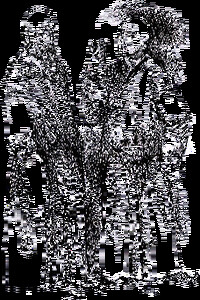Mastering the Core Teachings of Buddha. An Unusually Hardcore Dharma Book | страница 40
Thoughts, the breath, and all of our experience don't quite seem to be in our control, do they? That's it! Know this moment to moment.
Don't struggle too much with reality, except to break the bad habits of being lost in stories, poor concentration, and a lack of understanding of the Three Characteristics. Allow vibrations to show themselves and tune into the sense that you don't have to struggle for them to arise. Reality 31
The Three Characteristics
just continues to change on its own. That's really it. Investigate this again and again until you get it. Notice that this applies to each and every sensation that you experience.
So, while we can direct the mind to penetrate into phenomena with great precision and energy, we can also sit quietly and allow reality to just show itself as it is. Both perspectives are important and valuable, and being able to draw on each along the way can be very helpful. Said another way, we can realize that reality is already showing itself, settle quietly into this moment, and be clear and precise about it.
Obviously there is a bit of a paradox here relating to effort and surrender. In many ways it is at the heart of the spiritual life. There is a lot of advice available on this point, but in terms of insight meditation practice I would say this: If when meditating you can perceive the arising and passing of phenomena clearly and consistently, that is enough effort, so allow this to show itself naturally and surrender to it. If not, or if you are lost in stories, then there are some teachings coming up in the other lists that may help.
For day-to-day reality, the specifics of our experience are certainly important, but for insight into the truth of things in meditation they largely aren't. Said another way, it is neither the object of meditation, the causes of the object of meditation, nor the significance of the object of meditation, but the truth of the sensations that make up that “object”
which must be understood. Once you can tell what is mind and what is body, that's for the most part enough. So don't make stories, but know this: things come and go, they don't satisfy, and they ain't you. That is the truth. It is just that simple. If you can just not get to caught up in the content and know these simple, basic and obvious truths moment to moment, some other wordless and profound understanding may arise on its own.
A useful teaching is conceptualizing reality as six sense doors: touch, taste, seeing, hearing, smelling, and thought. It may seem odd to consider thought as a sense door, but this is actually much more reasonable than the assumption that thoughts are an “us” or “ours” or in complete control. Just treat thoughts as more sensations coming in which must be understood to be impermanent, unsatisfactory and not self. In this strangely useful framework, there are not even ears, eyes, 32



